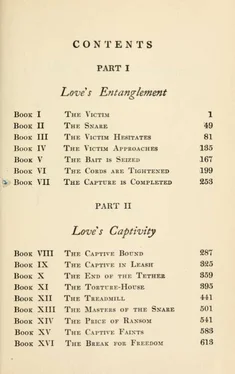Upton Sinclair - Love's pilgrimage
Здесь есть возможность читать онлайн «Upton Sinclair - Love's pilgrimage» весь текст электронной книги совершенно бесплатно (целиком полную версию без сокращений). В некоторых случаях можно слушать аудио, скачать через торрент в формате fb2 и присутствует краткое содержание. Год выпуска: 1911, Издательство: New York : M. Kennerley, Жанр: Старинная литература, на английском языке. Описание произведения, (предисловие) а так же отзывы посетителей доступны на портале библиотеки ЛибКат.
- Название:Love's pilgrimage
- Автор:
- Издательство:New York : M. Kennerley
- Жанр:
- Год:1911
- ISBN:нет данных
- Рейтинг книги:4 / 5. Голосов: 1
-
Избранное:Добавить в избранное
- Отзывы:
-
Ваша оценка:
- 80
- 1
- 2
- 3
- 4
- 5
Love's pilgrimage: краткое содержание, описание и аннотация
Предлагаем к чтению аннотацию, описание, краткое содержание или предисловие (зависит от того, что написал сам автор книги «Love's pilgrimage»). Если вы не нашли необходимую информацию о книге — напишите в комментариях, мы постараемся отыскать её.
Love's pilgrimage — читать онлайн бесплатно полную книгу (весь текст) целиком
Ниже представлен текст книги, разбитый по страницам. Система сохранения места последней прочитанной страницы, позволяет с удобством читать онлайн бесплатно книгу «Love's pilgrimage», без необходимости каждый раз заново искать на чём Вы остановились. Поставьте закладку, и сможете в любой момент перейти на страницу, на которой закончили чтение.
Интервал:
Закладка:
ivory. And Delia might go there, and try to teach them and help them, but she would find that there were forces engaged in beating them down and destroying them—forces in comparison with which she was as helpless as a child. It was true of the Congo blacks, as it was true of the people of the slums, of the proletariat of the whole earth, that there was no way to help them save to overthrow the system which made of them, not human beings, but commodities, to be purchased and passed through the profit-mill, and then flung into the scrap-heap.
But Thyrsis found to his pain that it was impossible to make these considerations of any real import to Delia. She understood them, she assented to them; but that did not make them count. Her impulses came from another part of her being. Her savages were naked and hungry and ignorant and miserable; and they needed to be fed and clothed, and more important yet, to be baptized and saved. She was all the more impelled to her task by the fact that all the forces of civilization were arrayed against her. The fires of martyrdom were blazing in her soul. She meant to throw herself over a precipice—and the higher the precipice, and the more jagged the rocks beneath, the greater was the thrill which the prospect brought her.
§ 4. THEY went back to the house; as Delia had arranged to spend the night with them, and as Cory-don's headache was better, the controversy was continued far into the evening. Thyrsis took no part in it, he listened while Corydon pleaded for herself, and pictured her loneliness and despair.
Delia put her arms about her. "Don't you see, dear," she argued—"all that is because you are without
a faith! You cast out Jesus, and deny him; and so how can 7 help you? If you believed what I do, you would not be lonely, even if you were in the heart of Africa."
"But how can I believe what isn't true?" cried Cory-don ; and so the skeletons of theology came forth and rattled their bones once more.
A couple of hours must have passed, while Thyrsis said nothing, but listened to Delia and watched her, probing deeply into the agonies and futilities of life. He had given up all hope of persuading her to stay with them; he thought only of the tragedy, that this noble spirit should be tangled up and blundering about in the mazes of a grotesque dogma. And the time came when he could endure it no more; something rose up within him, something tremendous and terrible, and he laid hold of Delia Gordon's soul to wrestle with it, as never before had he wrestled with any human soul except Corydon's.
The truth of the matter was that Thyrsis loved the religious people; it was among them that he had been brought up, and their ways were his ways. This was a fact that came to him rarely now, for he was hard-driven and bitter; but it was true that when he sneered at the church and taunted it, he was like a parent who whips a child he loves. Perhaps Paret had spoken truly in one of his cruel jests—that when a man has been brought up religious, he can never really get over it, he can never really be free.
So now Thyrsis spoke to Delia as one who was himself of the faith of Jesus; he cried out to her that what she wanted was what he wanted, that all her attitudes and ways of working were his. And here were monstrous evils alive upon the earth—here were all the
forces of hell unleashed, and ranging like savage beasts, destroying the lives of men and women! And those who truly cared, those who had the conscience and the faith of the world in their keeping—they were wasting their time in disputations about barren formulas, questions which had no relationship to human life! Questions of the meaning of old Hebrew texts that had often no meaning at all, and of folk-tales and fairy-stories out of the nursery of the race—the problem of whether Jonah had swallowed the whale, or the whale had swallowed Jonah—the problem of whether it was on Friday or Saturday that the Lord had finished the earth. Because of such things as this, they drove all thinking men from their ranks, they degraded and made ridiculous the very name of faith! As he went on, the agony of this swept over Thyrsis—until it seemed to him as if he had the whole Christian Church before him, and was pleading with it in the voice of Jesus. Here was a new crucifixion—a crucifixion of civilization! Thyrsis cried out in the words, "Oh ye of little faith!" Truly, was it not the supreme act of infidelity, to make the spirit of religion, which was one with the impulse of all life— the force that made the flower bloom and oak-tree tower and the infant cry for its food—to make it dependent upon Hebrew texts and Assyrian folk-tales! Delia preached to him about "faith"; but what was her faith in comparison with his, which was a faith in all life— which trusted the soul of man, and reason as part of the soul of man, a thing which God had put in man to be used, and not to be feared and outraged.
Then came Delia. She would not admit that her faith depended upon texts and legends; it was a faith in the living God. She was not afraid of reason—she did not outrage it—
"But you do, you do!" cried Thyrsis. "Your whole attitude is an outrage to it! You never speak of 'science' except as an evil thing. You told Corydon that 'evolution' was wicked!"
"I don't see how evolution can help my faith" began the other.
"That's just it!" cried Thyrsis again. "That is exactly what I mean! You do not pay homage to truth, you do not seek it for its own sake! You require that it should fit into certain formulas that you have set up —in other words that it should not interfere with your texts and your legends! And what is the result of that —you have paralyzed all your activities, you have condemned your intellectual life to sterility! For we live in an age of science, we cannot solve our problems except by means of it; the forces of evil are using it, and you are not using it, and so you are like a child in their hands! Not one of the social wrongs but could be put an end to—child-labor, poverty and disease, prostitution and drunkenness, crime and war! But you don't know how, and you can't find out how—simply because you have thrown away the sharp tools of the intellect, and filled your mind with formulas that mean nothing! How can you understand modern problems, when you know nothing about economics? You have rejected 'evolution'—so how can you comprehend the evolution of society? How can you know that civilization at this hour is going down into the abyss—dragging you and your churches and your Congo savages with it? I who do understand these things—I have to go out and fight alone, while you are shut up in your churches, mumbling your spells and incantations, and poring over your Hebrew texts! And think of what I must suffer, knowing as I do that the spirit that animates you—the fervor
and devotion, the 'hunger and thirst after righteousness'—would banish horror from the earth forever, if only it could be guided by intelligence!"
§ 5. ALL this, of course, was effort utterly wasted. Thyrsis poured out his pleadings and exhortations, his longing and his pain; and when he had finished, the girl was exactly where she had been before—just as distrustful of "science", and just as blindly bent upon getting away to her savages and binding up their wounds and baptizing them. And so at last he gave up in despair, and left Delia to go to bed, and went out and sat alone in the moonlight.
Afterwards, though it was long after midnight, Corydon came out and joined him. He saw that she was flushed and trembling with excitement.
"Thyrsis!" she whispered. "That was a marvellous thing!"
He pressed her hand. "And all thrown away!" she cried. "You realized that, did you?" he asked. "I realized many things. Why you set so much store by ideas, for instance! I see that you are right -one has to think straight!"
Читать дальшеИнтервал:
Закладка:
Похожие книги на «Love's pilgrimage»
Представляем Вашему вниманию похожие книги на «Love's pilgrimage» списком для выбора. Мы отобрали схожую по названию и смыслу литературу в надежде предоставить читателям больше вариантов отыскать новые, интересные, ещё непрочитанные произведения.
Обсуждение, отзывы о книге «Love's pilgrimage» и просто собственные мнения читателей. Оставьте ваши комментарии, напишите, что Вы думаете о произведении, его смысле или главных героях. Укажите что конкретно понравилось, а что нет, и почему Вы так считаете.












